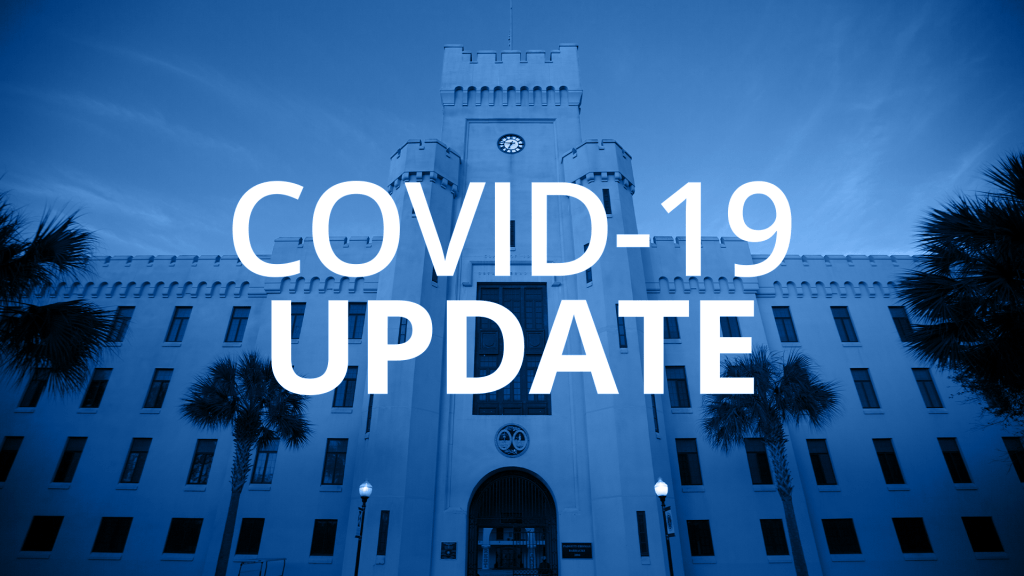
Provost discusses modifications for fall semester
The President of the Citadel, General Glenn M. Walters, USMC (Ret.), initiated The Citadel’s Operation Fall Return 2020, which outlines the processes, procedures, and facilities modifications put in place to support a healthy teaching and learning environment for the Fall of 2020. The plan is based upon guidance published by the Center for Disease Control (CDC), input from a Presidential Advisory Board consisting of prominent medical professionals, and emerging successful practices from colleges and universities from across the country.
This portion of the report provides a description of the plan related to academic operations and is broken into two sections — Healthy Environments, which outlines the modification made to the physical space, and Healthy Operations, which outlines the changes to academic operations to support the return to the classroom.
Healthy Academic Environments
Modified Room Capacities and Physical Barriers
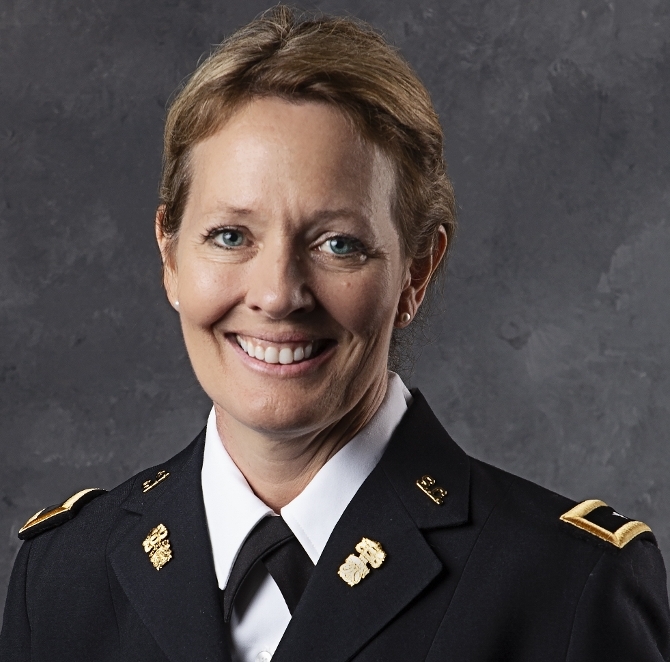
The physical environment existing prior to the pandemic supported students and faculty coming together and interacting collaboratively in shared spaces, many of which were quite small. But a key element preventing the spread of COVID-19 is to maintain a social distancing of 6-foot or greater. This shift in approach to space has required significant modification to the teaching and learning environment to support a healthy environment. In preparation for the Fall, the capacity of every academic classroom, lab, office, and common space has been evaluated and updated to comply with the 6-foot spacing requirement. New room capacities have been published on easy to understand signage on every door and modified seating charts have been provided to guide the campus community to proper seating to ensure appropriate spacing. In locations where it is difficult to maintain safe distancing, plexiglass barriers have been installed as a physical barrier to help reduce the spread of the virus. Along with the physical modifications to the academic spaces, consistent signage meant to remind and encourage social distancing has been installed.
Cleaning/ Disinfection Academic Spaces
Many academic spaces are used frequently throughout the day. The customary practice of cleaning academic spaces just once a day is not consistent with recommended operation of facilities during a pandemic. In response to the need for additional cleaning and disinfecting throughout the day, several changes have been made to the cleaning operation, and additional disinfection products have been provided. The Citadel’s contract cleaning service will provide disinfection of frequently touch surfaces like door handles and stair rails throughout the day. Standard daily cleaning of the spaces which will continue but additional disinfect each evening will be provided using a electrostatic atomizer and a disinfection solution that will kill any viruses left on surfaces. The campus community expressed a desire for on demand disinfection. In each academic space, disinfections wipes for all surfaces excluding electronics, alcohol wipes for all electronics, and hand sanitizer will be stocked daily. As an additional measure, on-demand atomizers filled with disinfection solution will be made available for faculty use. Instruction on the safe and proper use will be provided as well as on-demand training for those who require it.
Healthy Academic Operations
Personal Protective Equipment and Promoting Healthy Behaviors
Along with a culture that promotes the practice of healthy behaviors, the proper personal protective equipment (PPE) is critical to limiting the spread of the virus. The Citadel has adopted a leveled protocol outlining the conditions and degree of PPE required for a given condition. In short, face masks will be required of all faculty, staff, and students. They will be worn at all times with a few exceptions.
- Faculty or staff members working in their offices do not need to wear masks as long as they are alone.
- A faculty member teaching a course and maintaining 6-foot separation from students will be permitted to wear a face shield in lieu of a face mask.
These are the only exceptions to the face mask policy.
In support of this policy, The Citadel has supplied all faculty and staff with face masks. Face shields will be provided upon request. Students will be issued four face masks, and additional face masks will be available for purchase in the cadet store.
Appropriate PPE is essential, but without other healthy behaviors PPE is not enough. The Citadel adopted a stay home or self-isolate policy for all faculty and staff when appropriate. Signage has been installed to remind the campus community that if they are experiencing any signs of COVID-19 they should stay home and notify their supervisor. In addition, hand hygiene and respiratory etiquette are being emphasized through official policies and reminders through appropriate signage placed strategically around campus.
Classroom Pedagogy to Support Social Distancing
The reduced capacity in the classroom, together with the expectation that some students will be unable to attend class due to either illness or required quarantine isolation, has required modification to classroom instruction.
The Citadel will be utilizing a modified HyFlex or split class approach to instruction. Depending on the room capacity and the class enrollment, classes may be divided into groups of two (A/B) or three (A/B/C). Or if the class is small enough and the room is large enough, the class will remain undivided. For the undivided classes, students will attend as they traditionally have but with everyone in the class maintaining 6-foot spacing. For the classes that require dividing, students will attend in person on their designated days and participate synchronously while livestreaming through Zoom on the other days. This mix of in person and synchronous livestream through Zoom will provide the required social distancing while minimizing the impact to instruction. Each classroom has been equipped with a SWIVL and each professor has been provided an iPad to support this approach. The SWIVL has the ability to move the camera on the iPAD to follow the professor as they instruct. Since the courses are offered synchronously, students who are livestreaming will be able to ask questions and engage the professor during instruction similar to the students attending in person. This approach will also accommodate the students who are healthy but unable to attend in person because of quarantine requirements as well as those students who have contracted the virus but are still healthy enough to engage in their education while recovering.
Sally Selden, Ph.D., SPHR
Provost and Dean of The Citadel

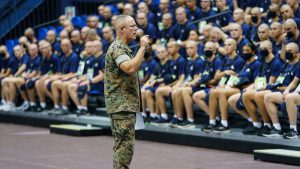 Returning to campus: instructions from the Commandant of Cadets
Returning to campus: instructions from the Commandant of Cadets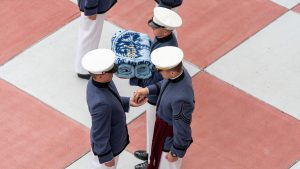 Preparing for Parents’ Weekend 2021
Preparing for Parents’ Weekend 2021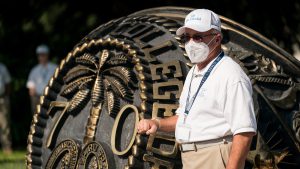 The rewind: celebrating the Class of 1970 and more
The rewind: celebrating the Class of 1970 and more

